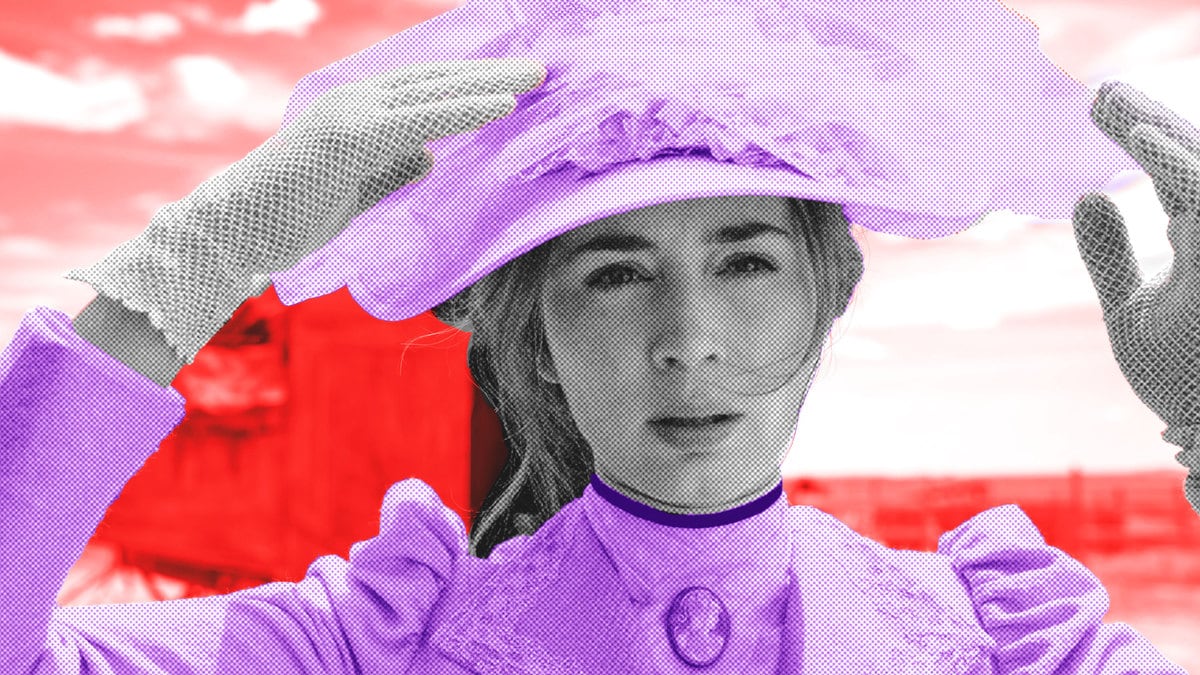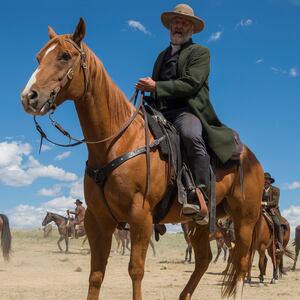The American West of the 1890s was an unforgiving and cruel place. Land, freedom, and happiness were hard-fought but never guaranteed amidst the greed of white colonialists carrying out the twisted and genocidal tenets of Manifest Destiny. The West was sparse, as were the rewards, and every day brought a new, unexpected battle. Making a life in the post-Civil War plains was an uncharitable undertaking for a pitiless people.
At times, writer/director Hugo Blick’s epic six-episode western The English, out Friday on Prime Video, can feel a lot like that: sprawling and demanding, an almost thankless task. It is not an easy watch by any stretch of the imagination. Perhaps that’s what makes the payoff so sizable.
Despite its near-insurmountable density, The English ends six protracted hours as one of the year’s most memorable series, thanks largely in part to its astounding two leads. Emily Blunt stars as Lady Cornelia Locke, an English noblewoman who arrives in the post-war wasteland of the American West with an unyielding taste for revenge. Her destiny binds her to Chaske Spencer’s Eli Whipp, a Pawnee ex-Army scout who has spent most of his life serving his own interests to stay alive.
Blunt and Spencer have a captivating onscreen chemistry. Eli and Cornelia find themselves undeniably linked by a moment in time—a dose of magic that brought them together, as Cornelia says—and watching them uncover the mystery of their shared past is what keeps The English from buckling under its massive scope. This pair of marvelous performances, and the breathtaking technicolor landscapes they’re splashed against, come together to help The English transcend its overstuffed writing, turning the series into an unmissable modern Western.

“Without you, I’d have been killed,” Cornelia says in a voiceover, opening the series. “That’s how we met, that’s why we met. It was in the stars.” When Cornelia first sees Eli, he’s been tied up and held prisoner for the crime of ordering a drink at a white man’s hotel. There’s no actual criminality in Eli’s request. But in a lawless land, a wrong move has put him in the right place for destiny to intervene.
Cornelia has been in America for weeks, using bags of unbanked cash to help her navigate a strange land. She pays off anyone she can to take her further. Her offer to pay for Eli’s release is refused with an assault by the hotelier, knocking her out and sending Eli, handcuffed in a stagecoach, in the other direction. But when a chance encounter leads to Eli’s escape, he returns to Cornelia, by way of a knife in her captor’s back.
Thus, the two are bound by bloodshed. Cornelia knows that the success of her mission hinges on her skills with a gun; she’s seeking revenge on the man she believes killed her son, and her festering anger can only do so much without the proper tools. Eli, torn between the life he had before joining an army cavalry and his post-war insularity decides to join Cornelia to reclaim Pawnee land and see the demise of its colonizers along the way. From that moment, Cornelia and Eli have united in something bigger than themselves, a violent, cosmic mystery that will set forth a chain of events that was in place long before the two of them ever met.
To understand that mystery, you’ll be tasked with a daunting voyage of your own: completing all six episodes.
By the end of the first, you’ll be forgiven if you don’t understand what’s going on. I spent a great deal of The English unsure of exactly what I was supposed to be taking from each episode, trying so hard to ascertain the purpose of each of the series’ many detours. The watch can occasionally feel punishing. Masochism is not the foremost feeling we’re seeking from television.
In this Wild West, there are hucksters peddling information like farmed resources; there are killers who ride with freshly-sheared scalps dangling from their horses; there’s a town built on a secret that slowly changes hands as time goes on, complete with English cattle drivers and hard-nosed widows; there’s a woman named Black Eyed Mog, who is the scariest thing I’ve ever seen on television.
Why viewers spend time with these tangential characters is something that doesn’t become clear until the series’ final episodes. Pulling focus away from Spencer and Blunt for these convoluted subplots causes The English’s operatic nature to hit an off-note, even if it’s intentional. What was sharp and vivid only seconds earlier quickly becomes brittle and, at the risk of being gauche, momentarily boring. But just around the corner is another tremendous thrill.
For a series that is jumbled to the point of near discombobulation, it sure is gorgeous to look at. Aesthetically, everything about The English is sumptuous. Strikingly bright yellow fields cascade across the frame, positioned against blue skies with perfect clouds that look so unbelievably remarkable, they could be paintings. Scenes look like they’re being filmed on location, on a soundstage, and against flat fabric, old Hollywood backdrops. Like Spaghetti Westerns of yore, much of the series was filmed in Europe, along the kaleidoscopic Spanish countryside. Cinematographer Arnau Valls Collomer brings lasting life and warmth to the desolate American plains. Simply speaking: The English is one of the most visually arresting series of the year.

Compounding all of that beauty are Blunt and Spencer, whose performances both beg for there to be a word even more concise than “triumphant” to underscore their brilliance. Part of what makes The English’s scattered plotlines so frustrating is that, from their very first scenes, we’re all-in on their unlikely dynamic. In just a few frames, Blunt can move between tepidity and the showy courage of a career gunslinger. We feel the depths of her sorrow and her settled ache for revenge; when Cornelia’s motivations come into focus in the latter half of the series, Blunt does some of the best work of her career reminding us just how powerful a mother’s love can be.
And after a long, underappreciated career, Twilight veteran Chaske Spencer leads The English with all the natural grace and formidable talent of the greatest Western actors. He holds Eli’s patchwork of emotions like a deck of cards, playing each one at the exact right time. Somehow, Spencer wears love, loss, fear, and anger all at once without ever feeling false. It is a bold and commanding performance, often delivered with only a few words.
The English takes work, there’s no doubt about that. This is phone-down, no-talking programming. For some (unfortunately, I suspect, for many), that will prove too daunting a demand. But for those who are up to the challenge, the series’ payoffs will prove far more memorable than all of the effort it took to get there. A little inference and a dash of patience are necessary—this is a Western, after all.
This is Blick’s bleeding-hearted love letter to the genre, and by its end, The English join the ranks of the grandest entries ever made.







